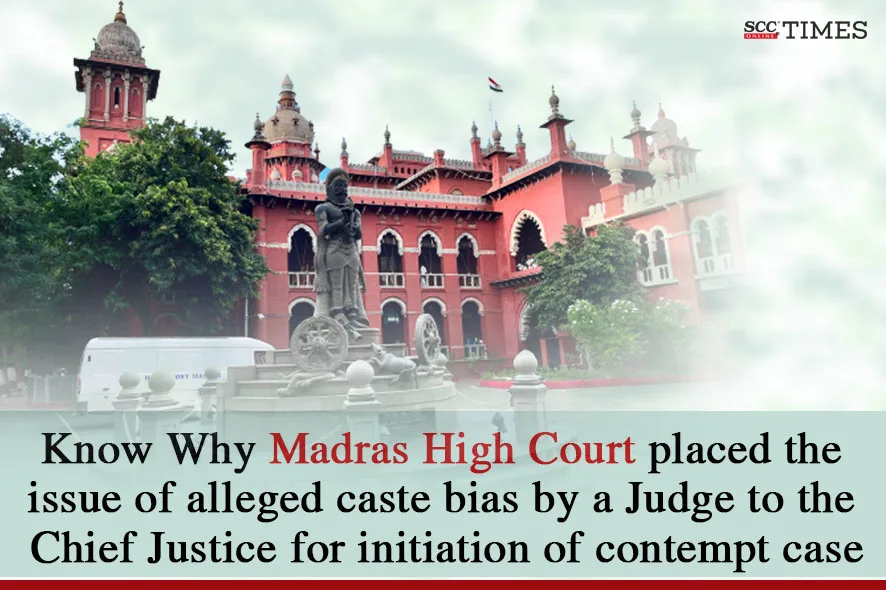Madras High Court: The present writ appeal was filed by the appellant challenging the order dated 17-6-2025 passed earlier in administrative disputes with respondents including Tamil University, its Vice Chancellor etc.,. During the hearing, allegations of caste bias was passed against one of the High Court Judges by an advocate. The Division Bench of G.R. Swaminathan and K. Rajasekar, JJ., took note of the accusations attributing caste or religious bias being shown by a member of the Bench and opined that in the name of freedom of speech, one must not condone acts of contempt. The Court directed the Registry to place the matter before the Chief Justice of the Madras High Court for appropriate actions.
Background:
The appeal arose from administrative disputes involving Tamil University. During its hearing, the Court noted that one of the representing advocate had publicly accused the Judge hearing the case, of caste bias through several interviews on various YouTube Channels. When summoned, the advocate declined to answer the Bench’s direct question on whether he stood by his allegations and instead demanded a written questionaire. Consequently, a pre-cognizance notice was issued to him.
In the intervening weekend, a hall meeting and press conference were organised, and the statements were issued by several retired Judges questioning the process adopted by this Bench.
Taking note of the statements issued by former Judges, the Court expressed its dismay over such interference with judicial process and noted that these assumptions had no factual basis. The Bench further clarified that the issuance of the pre-cognizance notice was unrelated to any complaint allegedly sent to the Chief Justice of India by the advocate in question but was instead issued because of the persistent campaign being conducted on the social media against a sitting Judge attributing improper motives in judicial functioning.
The Court referred to Halsbury’s Laws of England, wherein it was held that scurrilous abuse or personal attacks on a Judge or court amounted to punishable contempt, as the objective was not to shield individual Judges from criticism, but to protect public confidence in the administration of justice. The Court further relied on Vijay Kurle, In re, (2021) 13 SCC 616, and observed that if such slanderous and scandalous allegations which had not only been communicated to the President of India and the Chief Justice of India, but also widely circulated on social media were permitted to remain unchallenged then the public would lose faith not only in those particular Judges but also in the entire justice delivery system.
The Court also took note that the advocate in his reply had submitted that it was the Chief Justice of Madras High Court who could take a call in the matter.
Observations:
The Court emphasised that judicial independence was a basic feature of the Constitution, and the Judges had taken oath to discharge their judicial duties not only without favour but also without fear. The Court further highlighted that when a Judge sat on the dais, he discharged his judicial duties as per his conscience and by strictly adhering to the judicial oath and he must not be seen as carrying on his caste or religious labels while on the bench.
The Court observed that the legal system provided for remedies and recourse had to be taken to them by persons aggrieved by individual decisions, and without doing so, launching communal campaigns on the social media would eventually weaken the system itself. The Court noted that time had come to regulate the level of discourse in the social media, since, in the name of freedom of speech and expression, one could not condone acts of contempt.
The Court noted that while Article 19 of the Constitution guaranteed freedom of speech, such freedom did not extend to actions such as casting scurrilous and objectionable remarks against Judges and attributing improper motives to those discharging judicial functions. The Court further criticised attempts made by Senior lawyers and retired Judges for giving public statements and stated that their order would only conform to procedural rules and not be governed by such public statements.
The Court, therefore directed the Registry to place the papers before the Chief Justice of the Madras High Court for further actions that deemed fit and appropriate.
[Dr. D. Vetrichelvan v. Tamil University, 2025 SCC OnLine Mad 3900, decided on 28-07-2025]
Advocates who appeared in this case:
For the Appellant: B. Saravanan, Senior Counsel for D. Kirubakaran.
For the Respondents: Sachin Rahul for Arul Vadivel Associates, G. Prabhu Rajadurai for R. Ganesh Prabhu, C. Venkatesh Kumar, Special Government Pleader.



